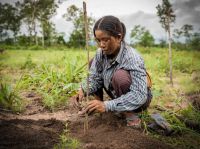Key messages

- ©Brent Stirton/Getty Images for FAO, CIFOR, CIRAD and WCS
The forest sector generates jobs for at least 33 million people, and forest products are used by billions.
It is estimated that more than half the world’s economic production [i.e. GDP] depends on ecosystem services, including those provided by forests. More than half the total world population is estimated to use non-timber forest products to support their well-being and livelihoods.

- © Joan Manuel Baliellas
Forests are essential for planetary health and human well-being.
Forests cover nearly one-third of the Earth’s land surface and provide people with goods such as timber, fuel, food and fodder, help combat climate change, protect biodiversity, soils, rivers and reservoirs, and serve as areas where people can get close to nature.

- ©FAO/Charlotte Windle
Sustainably using forests will help us move to an economy based on renewable, reusable and recyclable materials.
Wood can be used for diverse purposes, with lower environmental impacts than many alternative materials. Wood used once can be reused and recycled, thereby extending its life and further reducing its material footprint.

- ©FAO/KWC
Expanding the use of forest products contributes to carbon neutrality.
Science and innovation are producing exciting new products from wood and trees, including textiles, foods, construction materials, cosmetics, biochemicals, bioplastics and medicines. Replacing less-sustainable materials with renewable wood and tree-based products can reduce the carbon footprint.

- © FAO/Luis Tato
Sustainable wood is an essential material for greening cities.
The building and construction sector is responsible for almost 40 percent of energy-related greenhouse gas emissions globally. Innovation is making it feasible to use more wood in tall buildings and other infrastructure – helping us “green” our cities because wood stores carbon, requires less energy to produce than many other construction materials, and provides good insulation.

- © FAO/Zinyange Auntony
Forests are vital for sustaining food production.
Forest ecosystem services – such as the maintenance of biodiversity, climate regulation, water and soil quality, and pollination – are essential for sustainable agrifood systems and feeding a growing global population. In addition, more than three-quarters of rural households worldwide are estimated to harvest wild foods from forests and other environments.

- © Enric Català Conteras
More action is needed to halt deforestation and degradation.
The world has lost 420 million hectares of forest – an area bigger than India – since 1990, and deforestation continues at about 10 million hectares per year, due mainly to agricultural expansion. Managing forests sustainably can help reduce deforestation and degradation, restore degraded landscapes, and provide people with jobs and renewable materials.

- ©FAO/Jerome Laporte
Choose wood products from legal and sustainable sources.
Consumers can contribute to the sustainable use of forests by choosing wood products with labelling or certification confirming that they come from legal and sustainable sources.
